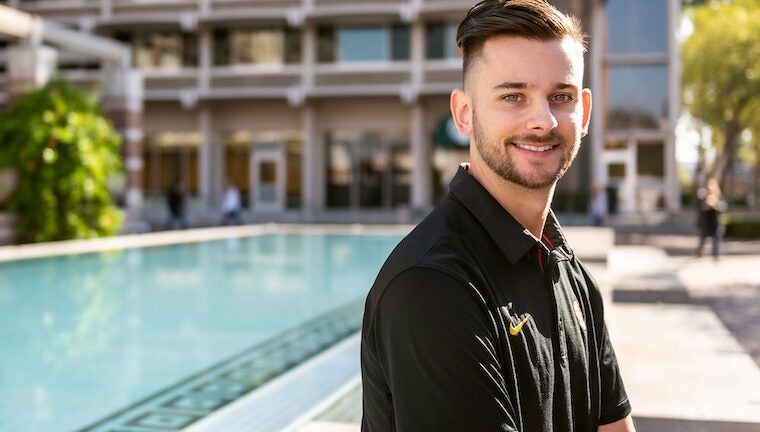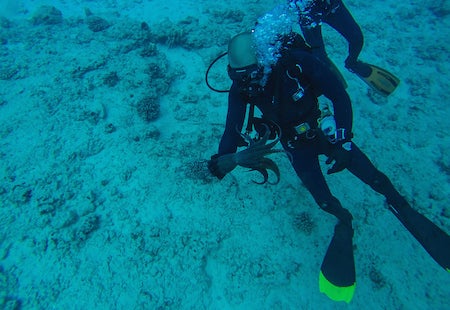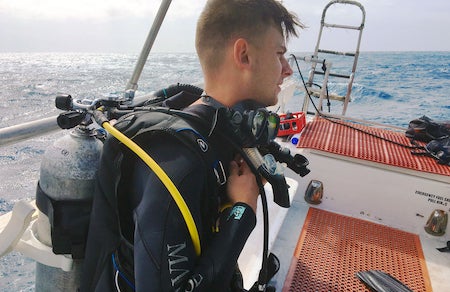
Scuba diving Marine finds his true calling
Nicholas Foster peered through his diving mask at the colorful reef teeming with sea creatures and spotted something glaringly out of place: a plastic shopping bag.
The Marine sergeant had come to a popular dive site known as Three Tables on Oahu’s North Shore to indulge in his scuba diving hobby during his downtime. While stationed in Hawaii, he had also started volunteering at beach cleanup events, so he glided forward to collect the bag and recycle it later.
Then he realized something was caught inside. As he carefully cut away the plastic, a light-blue striped fish wriggled free. But before darting off, it turned and met his gaze for three or four seconds.

An appreciation for sea life prompted Foster to pursue a degree in environmental studies at USC. (Photo: Courtesy of Nicholas Foster)
“I had this heart-to-heart moment with this fish,” Foster said. “In my mind, he was saying thank you. That’s kind of where it really solidified that I wanted to be part of a solution.”
That flicker of inspiration reinforced his decision to go into a career in ocean research and protection after completing his Marine Corps service. Foster, now 26, is set to graduate this spring from the USC Dornsife College of Letters, Arts and Sciences with a bachelor’s degree in environmental studies.
“I want to explore regions of the ocean that no one has ever seen before,” he said. “I want to measure the greater impact we’re having that we don’t even understand yet. And ultimately, I’d like to clean the ocean of plastics.”
Scuba hobby turns to lifelong passion
Drawn to discipline and service, Foster joined the Marine Corps after high school. Alongside his swell of patriotism, Foster wanted to explore the world. He got his wish: While based in Hawaii with the 1st Battalion 12th Marines at KÄÂneÊ»ohe Bay, he deployed throughout the Pacific, with stops in Okinawa, Thailand, Guam and the Philippines.
At each locale, he strapped on his flippers, oxygen tanks and other diving gear to explore the fascinating world below the ocean’s surface.
Despite discovering his love for all things aquatic, Foster wasn’t sure about his path after military service. While training in Twentynine Palms in the desert near California’s Joshua Tree National Park, Foster told an officer about his predicament. The officer’s advice: Go check out USC. Foster took some leave time and headed west to tour the campus.
“Immediately, something clicked: This is where I want to go to school, absolutely,” he said.

Foster put his scuba diving skills to use as a research diver with USC Dornsife’s Wrigley Institute for Environmental Studies.(Photo: Courtesy of Nicholas Foster)
Soon after enrolling, on the advice of USC ocean researcher Jill Sohm, he looked into the USC Wrigley Institute for Environmental Studies.
He discovered the institute’s scientific diving program based at Catalina Island and made sure he met all the requirements to become a research diver. Through USC Sea Grant, he connected with other underwater researchers and began scuba diving to survey areas of the ocean floor, measuring vegetation cover and marine life.
Undergrad blends sustainability and technical skills to protect the ocean
Although it felt great to be using his diving abilities in a scientific way, Foster sensed that something was missing.
Advice from another military friend proved fortuitous. Foster’s mentor in the Marines told him about a family member who was pursuing his master’s degree in the Spatial Sciences Institute at USC Dornsife. The institute’s scientists use advanced mapping and data analysis techniques to address global challenges like climate change and poverty. Intrigued by their new minor in GIS and sustainability science, Foster signed up to be in the first cohort.
He is now using his spatial mapping skills with USC Sea Grant to build a 3D model of rocky reefs in a protected habitat at Catalina Island called Blue Cavern. Using a remotely operated vehicle outfitted with a GoPro camera, he gathers underwater images to monitor algae growth. By stitching those images together on his computer, he’ll create a digital map of the region to assess the effects of temperature change and pH levels on ocean vegetation over time.
Foster plans to use his spatial analysis abilities and knowledge of the ocean ecosystem to tell powerful stories that prompt change at the policy level.
“The more I discover, the more I see what I can do with these skills,” he said, “and that’s what really motivates me.”